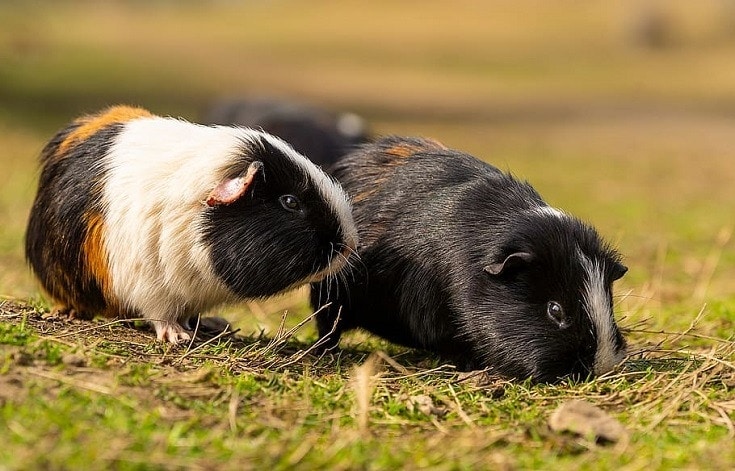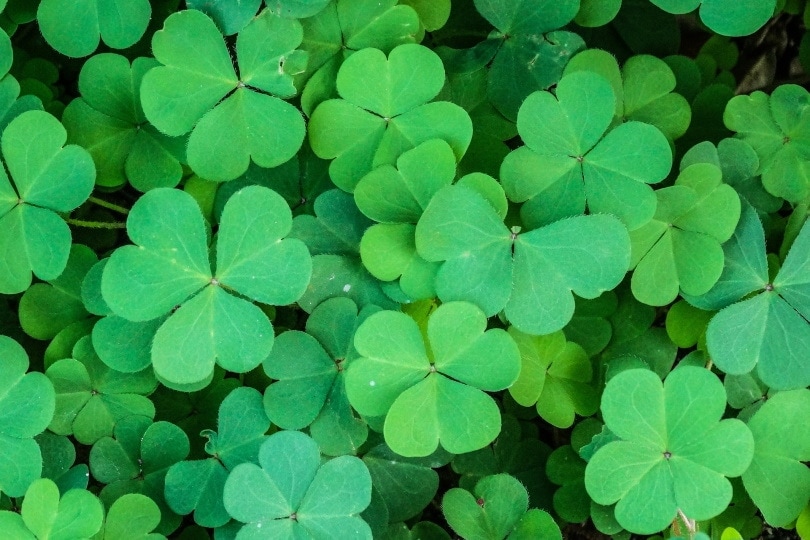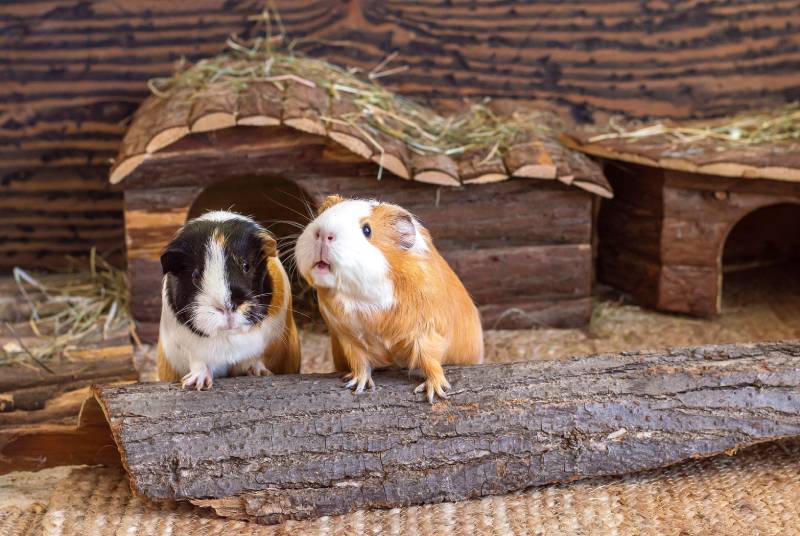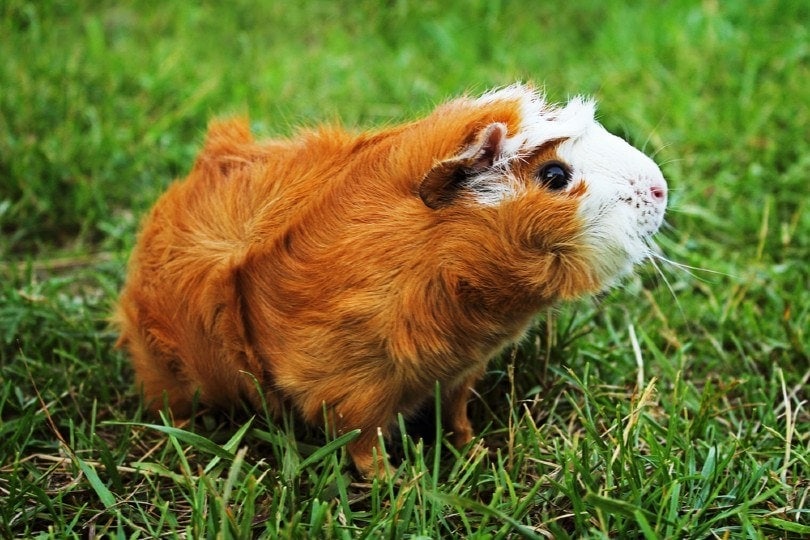Can Guinea Pigs Eat Clover? Vet Reviewed Facts & Concerns
Updated on

Click to Skip Ahead
Looking to add some fresh greens to your guinea pig’s diet? You might be wondering which plants are perfect for your piggies, and which ones to avoid. Clover falls somewhere in the middle.
Clover is a safe plant to offer your guinea pigs, and it contains quite a few essential nutrients, but as it contains high levels of calcium, we need to limit how much we give them.
What Does a Guinea Pig Eat Naturally?
You won’t find many guinea pigs in the wild these days. Most live luxurious domesticated lives. Still, we should strive to feed a species-specific diet that mimics what they would eat in the wild, to support our guinea pigs’ health. But what does a species-specific diet look like?
Guinea pigs spend most of their days naturally grazing on fresh roughage like grasses, herbs, wildflowers, and any other plant they might find appetizing. The texture of these plants helps prevent dental disease, the fiber keeps the gut healthy, while the vitamins and minerals keep the rest of their bodies functioning beautifully.
Domesticated guinea pigs don’t have ready access to fresh grass and other plants, so we must provide them with access to a large amount of grass hay, such as Timothy hay, to meet their fiber needs and keep their teeth healthy. The rest of their diet will be comprised of leafy greens, fresh vegetables, guinea pig pellets, and fruit, providing them with much needed nutrients.

The One Vitamin Guinea Pigs Must Have
One of the most important nutrients our guinea pigs need to consume is vitamin C, a vital nutrient that supports the immune system and helps grow and improve body tissues. Guinea pigs, like humans, can’t synthesize vitamin C on their own, so they need to obtain it from their diet. Guinea pigs need around 10-50 mg of vitamin C each day in order to prevent the painful and potentially fatal condition known as scurvy.
When grass is dried for long-term storage, much of the nutrition in the plant vanishes, so we need to be providing a range of food items to make sure our piggies get everything they need, particularly, vitamin C.
Where Does Clover Fit in With My Guinea Pigs Diet?
There are a number of ways that you might feed clover to your guinea pigs, and the nutritional value varies with each one. They all contain some Vitamin C, but there is limited information about exactly how much.
- On the ground – fresh from the source! As part of providing your cavy with exercise and enrichment, it’s a great idea to have an open-bottom cage that you can place on the grass to allow them to safely explore and graze. It is essential that you check the area for any potentially toxic plants, and make sure the area hasn’t been sprayed with pesticides.
- Sprouts – you might find clover and alfalfa sprouts in your fresh produce section, and if you don’t have a garden for guinea pig grazing, this can be a great option. Guinea pigs are particularly fond of these young shoots, so take care not to overdo it.
- Hay – clover hay is a high-energy, high-fiber, and high-calcium hay, which is why it is a popular choice for horses when fresh grass is limited. Your guinea pig will enjoy this type of hay, but it shouldn’t be fed in the same type of volumes as you would offer Timothy or Orchardgrass due to the high calcium content. It can, however, be a useful addition to young or pregnant guinea pigs.
Is Clover a Good Source of Vitamin C?
As we mentioned, it is difficult to get an accurate measure of the nutritional content of hay and forage like clover, but in the sprout form, we can learn that 1 cup (85g) of clover and alfalfa sprouts contains approximately 6 mg of vitamin C, so the average piggy would need to eat over 2 cups to meet their minimum requirement, and this is not a safe amount for two reasons.
- Calcium content: although some calcium is essential, too much can be dangerous for your guinea pig. It can lead to the formation of kidney and bladder stones.
- Too many fresh greens can cause diarrhea
So clover may be a tasty inclusion that provides some necessary nutrients, it has too much calcium and too little vitamin C to be overly useful.

Other Healthy Treats for Your Guinea Pig
Clover isn’t the only healthy snack to feed your guinea pig. You can offer all kinds of fruits, vegetables, and flowers that are probably in your fridge or growing in your yard. Just remember to offer snacks in moderation.
- Broccoli
- Bell pepper
- Chinese cabbage
- Collard greens
- Cress
- Dandelion greens
- Kale
- Kiwi
- Lettuce (Romaine)
- Papaya
- Parsley
- Strawberries
What Plants Are Toxic to Guinea Pigs?
Foods high in carbohydrates should never be given to your guinea pig, such as grains, legumes, cereals, oats, seeds, potatoes, and peas. Avoid foods that are particularly pungent like onions, garlic, ginger, and any foods related to these herbs. Nightshades are also toxic (although tomatoes are acceptable).
Fruit isn’t necessarily bad, but it’s high in sugar and can cause serious damage to your guinea pig’s health when offered in high amounts. Offer fruit seldomly as treats to avoid any health disruptions.
Other miscellaneous plants like houseplants, ivy, and mushrooms are to be avoided.
Conclusion
All parts of clover are acceptable for guinea pigs to munch, but it should not be fed to your cavy in large amounts. Being too high in calcium, it can be harmful if they eat too much, and it doesn’t provide high enough amounts of beneficial nutrients, like vitamin C, to be a necessary inclusion in their diet.
However, if you have your guinea pig soaking up some sunshine on the grass and they have a nibble on some clover, you can relax and let them enjoy it.
Featured Image Credit: bairli1, Pixabay











